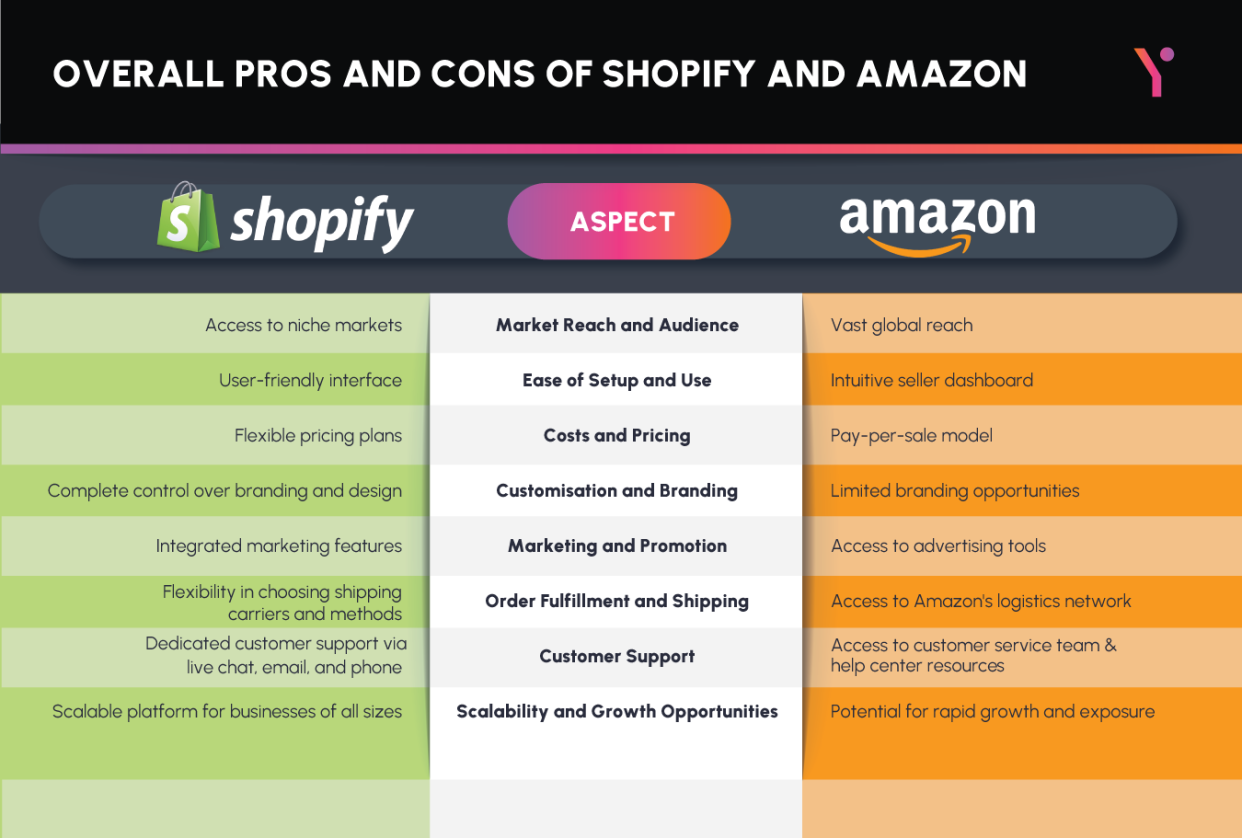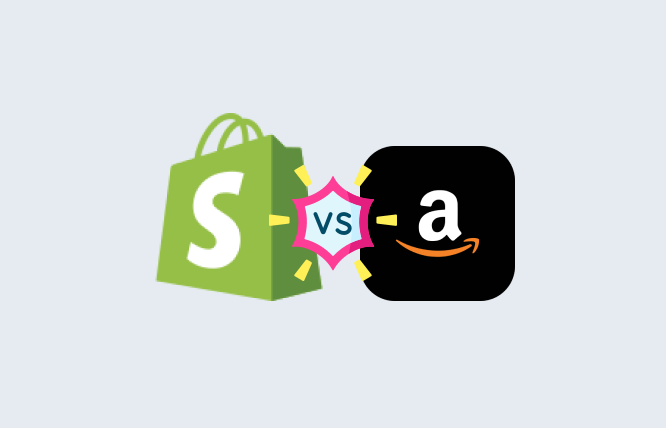Introduction
With the rise of e-commerce, businesses want to start selling online, but can’t choose which platform to go for. In this article we will discuss all the factors to keep in consideration when choosing an online store platform.
Shopify Vs Amazon
Shopify and Amazon are both great options for business owners that want to sell their products online. Each of these platforms have a number of positive regions to opt for either. Following are some of the primary aspects that business owners keep in consideration when choosing between Shopify vs Amazon.
Overall Pros and Cons of Shopify and Amazon 
Shopify and Amazon are both great for businesses trying to take their hand at online sales. You may need to recruit the help of Shopify plus agencies or Amazon developers. Following are some of the positive aspects of each of the platforms and why a business might choose one over the other.
Market Reach and Audience
One of the most important factors that need to be kept in consideration is the potential market reach and audience you can attract on a specific platform when deciding who wins between Shopify vs Amazon.
Amazon offers an extensive global reach with access to millions of active customers. Amazon has built its credibility over the years and the platform is trusted by millions, worldwide. That being said, Amazon gives you limited control over branding and customer relationships along with high competition among sellers.
On the other hand, Shopify will offer users the ability to target niche audiences, create customisable storefronts, and the opportunity to build a loyal customer base. There are a few roadblocks that Shopify users can experience. It requires independent marketing efforts to drive traffic and may not have the built-in audience of a marketplace like Amazon. To leverage the maximum potential of Shopify it is advised to recruit Shopify store development services.
Ease of Setup and Use
Another important aspect is to understand how challenging the setup of either of the platform can be for you based on complexity and time taken.
Amazon has a simple setup process, intuitive seller dashboard, established infrastructure for product listings and sales, making it extremely easy to setup. While the setup is easy, it is restricted by Amazon’s policies and guidelines with limited customisation options.
Shopify has an initial learning curve that may require a level of technical expertise for advanced customisation options. That being said, the user-friendly interface, drag-and-drop website builder, extensive app store for additional features all make for an improved website experience
Costs and Pricing Structure
The next factor to consider is the pricing of each platform and select the one that offers more feasibility. This can be a major aspect in the battle between Shopify vs Amazon. Amazon offers a pay-per-sale model with no monthly subscription fees for Individual sellers. It also offers access to Fulfillment by Amazon (FBA) for streamlined logistics. On the other hand, users might see the transaction fees and referral fees add up with limited control over pricing.
Shopify offers flexible pricing plans, no transaction fees with Shopify Payments, and scalable pricing as your business grows. Consequently, you will need to incur monthly subscription fees, additional costs for apps and add-ons, and transaction fees for third-party payment gateways.
Customisation and Branding
While Amazon offers a uniform product listing format and limited branding opportunities, Shopify enables businesses to create fully customisable storefronts and establish a unique brand identity.
With Shopify, sellers have complete control over branding and design, allowing them to differentiate themselves from competitors and create a memorable shopping experience for customers. However, achieving the desired level of customisation on Shopify may require design skills or the assistance of a developer, which can be a barrier for some businesses.
Marketing and Promotion
Amazon provides sellers with access to its advertising tools and exposure to millions of shoppers, making it easier to reach a broad audience and drive sales. However, sellers have limited control over advertising campaigns and may face stiff competition for visibility on the platform.
In contrast, Shopify offers integrated marketing features and compatibility with various marketing apps, allowing businesses to execute tailored marketing strategies and engage with their target audience effectively. While Shopify requires independent marketing efforts, it provides greater flexibility and control over promotional activities. One great way of improving traffic on your Shopify store is by leveraging search engine optimization services.
Order Fulfilment and Shipping
Amazon offers access to its robust logistics network and Prime eligibility for faster shipping, making it easier for sellers to fulfil orders and meet customer expectations. However, sellers are subject to Amazon’s shipping policies and fees, which can impact profitability.
On the other hand, Shopify provides flexibility in choosing shipping carriers and methods, as well as integration with various fulfilment services. While Shopify allows sellers to offer branded packaging and customise the shipping experience, it requires independent management of shipping logistics and may incur higher shipping costs.
Customer Support and Assistance
Amazon provides sellers with access to its customer service team for seller support and comprehensive help centre resources. However, sellers may experience long response times during peak periods and limited personalised assistance.
In contrast, Shopify offers dedicated customer support via live chat, email, and phone, as well as extensive documentation and community forums. While Shopify provides reliable customer support, response times may vary depending on the support channel and plan level.
Scalability and Growth Opportunities
Amazon offers businesses the potential for rapid growth and exposure, with access to its international marketplaces and millions of active shoppers. However, sellers have limited control over scalability and may face challenges such as account suspension or competition from Amazon’s private-label products.
Conversely, Shopify provides a scalable platform for businesses of all sizes, with the ability to expand product offerings and target new markets. While Shopify requires proactive business strategies for growth, it offers greater control over scalability and opportunities for long-term success.
Conclusion
With the rise in ecommerce and forecasts of it improving in the coming years, it is the right move for businesses to start expanding towards online. Currently the market has several options that can be explored with Amazon and Shopify being the top options. Based on your business requirements, you can choose a platform that works for you.
If you decide on Shopify, we have a team of Shopify developers that offer Shopify store development services dedicated to giving you a functional and easy-to-use online store. If you are looking to expand your business into the online realm, FuturByte has got you covered. We not only offer Shopify store development services but also offer WooCommerce web developer and WordPress website development. Get a free consultation today.
Also Read: Hire Someone to build Shopify Store
Frequently Asked Questions
Shopify offers flexible pricing plans with no transaction fees if you use Shopify Payments. In contrast, Amazon operates on a pay-per-sale model, where sellers are charged transaction and referral fees.
Shopify is often preferred by beginners due to its user-friendly interface and intuitive setup process. However, Amazon provides a built-in infrastructure for product listings, making it easier for sellers to start selling quickly.
Yes, Shopify offers complete control over branding and design, allowing you to customise your storefront to reflect your brand identity. However, Amazon has limited branding opportunities compared to Shopify.
Shopify provides integrated marketing features and compatibility with various marketing apps, giving sellers more control over their marketing efforts. On the other hand, Amazon offers access to advertising tools and exposure to millions of shoppers through its marketplace.
Shopify offers flexibility in choosing shipping carriers and methods, as well as integration with various fulfilment services. Amazon provides access to its logistics network and Prime eligibility for faster shipping.
Have questions or feedback?
Get in touch with us and we‘l get back to you and help as soon as we can!




